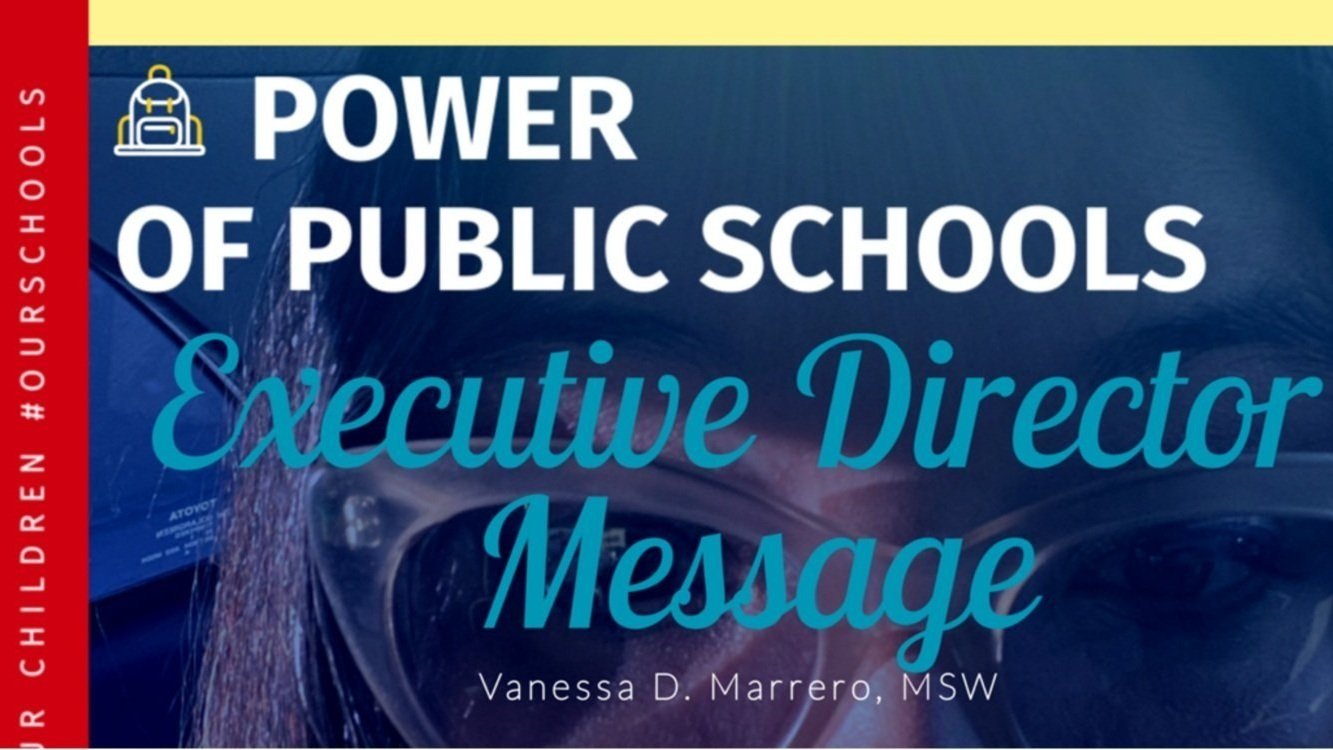Executive Director Message
Overlay photo of Power of Public Schools Executive Director Message
Read Executive Director Vanessa Marrero's Message:
As the year has progressed, Parents for Public Schools of San Francisco continues to recognize the importance of public education. Our fight for equity is long-standing. Although new measures have been taken to ensure that all students are being represented, there is still much work to be done. Considering the recent Board Meeting, it would be remiss not to mention the Parent Advisory Committee that is key in providing feedback to the District Local Control Accountability Plan and should be seen as the forefront of SFUSD (San Francisco Unified School District) organization as it aimed at helping underserved parents and students in the San Francisco school district.
As an organization that is dedicated to supporting all parents regardless of socio-economic status, we believe that it is our responsibility to bring our cares and questions to the greater public and those in positions of power regarding a new body, District Advisory Committee/Council that is charged with resource allocation across schools. Looking back at the last year, we can see a growing disparity in representation and school funding. The Parent Advisory Committee was created to understand students' needs through the appointment of parents who are representative of students in their districts, specifically those identified as socially disadvantaged, English learners, and foster youth. However, a glaring oddity has struck when looking at the potential success of this program.
While the School Board chooses who will serve on the Parent Advisory Committee and now also the District Advisory Council/ Committee, we urge those who hold power to look at the greater consequences of appointing through a narrow application only a small portion of members from zip codes of higher socioeconomic status rather than those which adequately represent, social-economic advantaged, students with disabilities, English learners and foster youth. If one of the key aspects of the LCAP (Local Control and Accountability Plan)’ plan*, the main continuity plan of Local Educational Agencies across California, is to ensure engagement with parents and caregivers of the district's highest-needs students, how does that retroactively work if the appointed parents are not serving the required bracket of socio-economic, English language learner and foster youth needs? In a report of applicants who applied, 35.2% identified as white, an overwhelming majority. It would serve the students best if there would be an alignment of % of underrepresented groups and chronic absenteeism to share experiences of the opportunity gap. The following are neighborhood percentages Bayview, Mission, Excelsior, with a total of 45.45% of selected members; Twin Peaks, Sunset, and Haight, Financial District, Mission Bay, in wealthier neighborhoods at 54.54%. We do not see any of the following neighborhoods with higher low-income percentages of communities represented SOMA, Visitation Valley, Sunnydale, Portero Hill, Western Addition, and Fillmore. Nor were certain populations of students identified such as socio-economic, English language learners, foster youth need, students receiving Special Education, and LGBTQIA students. Help is critically needed to bridge families closer to equitable access.
A care that is prominent in the minds of many has been school closures which our district is no stranger to. Low enrollment, attendance, and low assessment scores lead to the discussion; however, we do not see a pivot in questioning with the 5 Why’s as noted in the Continuous Network Improvement Sciences***. We have considered the consequences of this in our own assessment “School Closed” that sums up the need for an equally served PAC (Parent Advisory Committee), “Schools that are low performing need more highly skilled and culturally responsive teachers and school leaders, more resources, more accountability, more interventions, and more quality instruction.” By ensuring that our Advisory groups are representative of all parents, we can get to the real issues at hand before even beginning to make cuts to programs or closing schools. We need to ensure that the parents being selected are not only those who have social-political capital or live in wealthier zip codes. The glaring differences between successful schools and those with less resources come down to issues: race, disabilities, money, and recognition. However, if we look beyond there are instances of success when time and recognition are diligently put into the students who need it. In a article from Vanderbilt University, Doctor Pedro Noguera points to the successes in New York at P.S 138 in South Bronx or King/Drew Magnet School of Medicine and Science in Los Angeles, he stated “In these institutions, every child is nurtured with the belief that they are uniquely valuable, day in and day out.”
When a community is not even factored in on a google form, it sends clear messages around their importance on weighing in on the shared decision-making process. Dr. Noguera, underscores in this article “To understand the challenges facing students in big city school systems, pay close attention to who lives where, who moves in, and who is forced to move out.” (Noguera and Alicea, 2000)
Parents for Public Schools of San Francisco strongly urges the Board of Education to ensure representation of social-economic disadvantaged, English learner and newcomer students, foster youth, students with disability, and LGBTQI students on the District Advisory Committee/Council to ensure that we are bridging our families to equitable access and shared-decision making impacting our children.
*California Department of Education, Local Control Accountability Plan. https://www.cde.ca.gov/fg/aa/lc/lcfffaq.asp#PCE
** San Francisco Unified School District, Board of Education, Agenda, Item H1. Attachment 20231102 MASKED list of District Advisory Applicants for Resource Alignment
*** Carnegie Foundation, Network Improvement Sciences https://www.carnegiefoundation.org/our-ideas/
Structural racism and the urban geography of education
Pedro A. Noguera and Julio Angel Alicea
October 26, 2020
https://kappanonline.org/structual-racism-urban-geography-education-noguera-alicea/
Noguera: Education policymakers are focused on the wrong things
Nov 22, 2019

